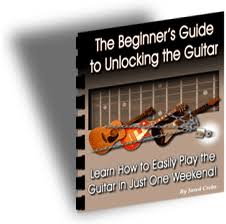Learn Acoustic Guitar DVD: Learn Without Adquiring Bad Practice Habits
Understand that becoming a better guitarist means becoming a better musician as well. When developing your musical skills, make sure to think beyond skills that are specific to guitar.
Like you probably have done, I have read a ton of interviews with great players and articles written by many of these same players. I often found it frustrating whenever the subject of learning to play guitar came up or when advice was offered on improving one's playing. With a small number of exceptions, very little time and space was offered on this.
But for many people, it is a very disconcerting experience. I have gotten letters from people who have read some things I have written, and become afraid to practice! They are so aware of, and on their guard against, excess muscle tension, and the devastating effects for the developing player, they are afraid to touch a string!
Don't compare yourself to others. There is no need to do this anyway. Music should not be a competitive sport among people, only within yourself. Compare yourself only in relation to where you are in your strategy! Are you on your way to reaching your next short term and medium term goal towards your ultimate goals? Are you on schedule, does your strategy need to be revised?
As I have said, some people become paralyzed, afraid to play, afraid of undoing work done in practice sessions by what they do when they play. And for those who play professionally, it is of course, absolutely necessary that they continue to play, even if they are doing "remedial" work on their technique.
You can undo bad habits you have learned along the way. You can begin the process of undoing bad habits right away, when you begin to acquire the correct understandings, and use the approaches based on them.
Knowing the fact that the approach you use to learn the guitar is the key-determining factor in your success or failure to actually learn, this conclusion follow:
Work on a lick you want to learn. You'd be surprised how many times you can work through a lick in just a few short minutes. - 18423
Like you probably have done, I have read a ton of interviews with great players and articles written by many of these same players. I often found it frustrating whenever the subject of learning to play guitar came up or when advice was offered on improving one's playing. With a small number of exceptions, very little time and space was offered on this.
But for many people, it is a very disconcerting experience. I have gotten letters from people who have read some things I have written, and become afraid to practice! They are so aware of, and on their guard against, excess muscle tension, and the devastating effects for the developing player, they are afraid to touch a string!
Don't compare yourself to others. There is no need to do this anyway. Music should not be a competitive sport among people, only within yourself. Compare yourself only in relation to where you are in your strategy! Are you on your way to reaching your next short term and medium term goal towards your ultimate goals? Are you on schedule, does your strategy need to be revised?
As I have said, some people become paralyzed, afraid to play, afraid of undoing work done in practice sessions by what they do when they play. And for those who play professionally, it is of course, absolutely necessary that they continue to play, even if they are doing "remedial" work on their technique.
You can undo bad habits you have learned along the way. You can begin the process of undoing bad habits right away, when you begin to acquire the correct understandings, and use the approaches based on them.
Knowing the fact that the approach you use to learn the guitar is the key-determining factor in your success or failure to actually learn, this conclusion follow:
Work on a lick you want to learn. You'd be surprised how many times you can work through a lick in just a few short minutes. - 18423
About the Author:
When it comes to learn to play guitar fast, getting the right information can be a daunting task. That's why we put together this confidential report for you at learn acoustic guitar dvd




